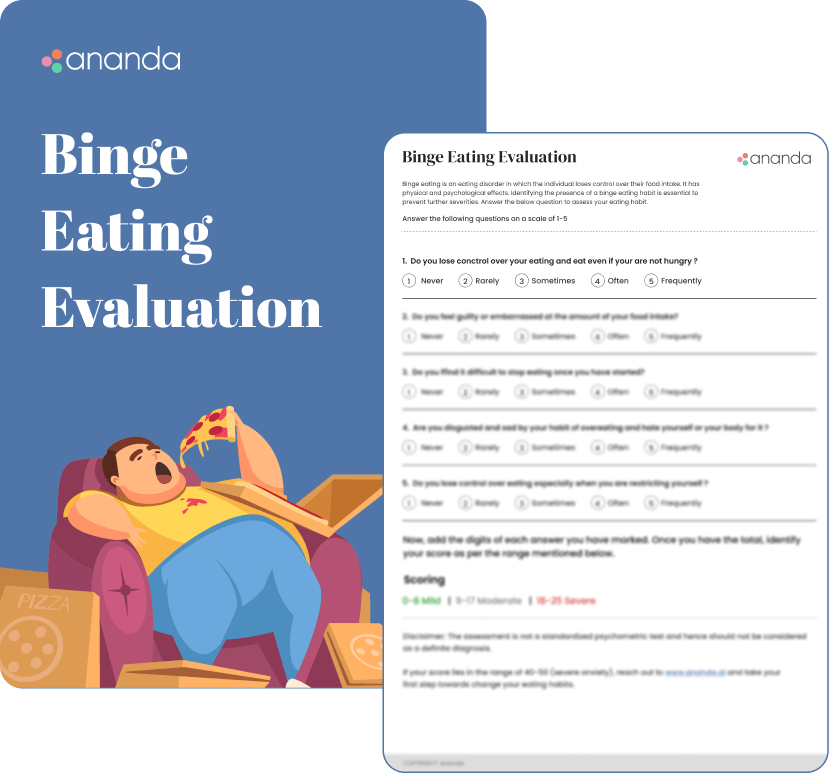Binge Eating Evaluation
The self-evaluation method is used to rate oneself on the basis of the score obtained on the test and to analyze the situation critically and act on it. This method will help individuals to honestly evaluate their strengths, and weaknesses and get to know themselves better.

Download "Binge Eating Evaluation"
The Binge Eating Evaluation is a short 5-item assessment wanting to measure your binge eating levels and trying to understand your mental health condition to the best.
Binge eating is when a person eats a much larger amount of food in a shorter period of time than he or she normally would. During binge eating, the person also feels a loss of control. Sometimes binge eating is a planned activity and other times it is not.
Severity of Binge Eating- Mild, Moderate, High
It will help you better understand your mental health condition.
The evaluation will help you gain insight into your emotions and work on them.
Frequently Asked Questions
The Binge Eating Evaluation is an assessment that will make you aware of your binge eating levels and its severity. This self-evaluation will give you a better understanding of the symptoms of binge eating, if you have any. It will also give you insights into any issues that you are facing at the moment and to seek help for them.
The biggest advantage of this test is that it gives you an overview of your overall mental wellbeing in general and whether you need to reach out to a mental health professional to seek help and guidance. Along with this, it will give you an insight into the physical as well as emotional signs and symptoms.
Once you have taken the evaluation and answered all the questions, you will be required to score yourself for each answer and get a total score as well as per the instructions given below the test. Your total score will determine the severity of binge eating that you may be facing. You can then proceed to book a session with Ananda if you feel so!
A binge eating episode can last over an hour, though it may be much shorter or longer. Most binges involve the consumption of more than 1,000 calories, with a quarter of binges exceeding 2,000 calories.
While certain thoughts and feelings can be temporarily relieved by a binge eating episode, it is often followed by intense emotional turmoil. Feelings of guilt about eating certain foods or eating in a certain way can contribute to the shame around having binge eating disorder. Shame and guilt can affect attention and concentration at school or work and can result in secretiveness around behaviors. It affects relationships and increases social isolation.
When you eat, your body uses some of the calories you consume for energy. The rest are stored as fat. Consuming more calories than you burn may cause you to become overweight or obese. This increases your risk for cancer and other chronic health problems. Eating large amounts of food in a short period of time also may result in acid reflux, cramping, heartburn, and diarrhea.
A binge eater often eats 5,000–15,000 calories in one sitting. They like to often snack and munch on mostly junk food, in addition to eating three meals a day. They also keep on overeating throughout the day.
Just as one day of dieting will not cause a person to lose weight, a day of binge eating will not cause weight gain. Although an episode of overeating can happen to anyone occasionally, some people have a binge eating disorder, which usually requires professional help.
